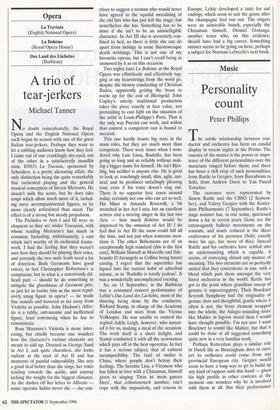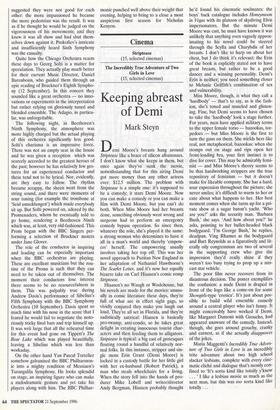M usic
Personality count
Peter Phillips
The subtle relationship between con- ductor and orchestra has been on candid display in recent nights at the Proms. The essence of the matter is the power or impo- tence of the different personalities over the musicians ranged before them; and there has been a rich crop of such personalities, from Rattle to Gergiev, from Barenboim to Solti, from Andrew Davis to Yan Pascal Tortelier.
The extremes were represented by Simon Rattle and the CBSO (2 Septem- ber), and Valery Gergiev with the Rotter- dam Philharmonic (7 September). Rattle's stage manner has, in one sense, quietened down a lot in recent years. Gone are the extravagantly balletic movements on the rostrum, and much reduced is the sheer exuberance of his presence (Solti, exactly twice his age, has more of this). Instead Rattle and his orchestra have settled into an understanding which is capable, it seems, of conveying almost any nuance of meaning. The two elements are so perfectly united that they concentrate as one, with a blend which puts them amongst the very finest orchestras in the world. Rattle has got to the point where grandiose sweep of gesture is supererogatory. Their Bruckner Seventh Symphony had the originality of genius: slow and thoughtful, gentle where it often is not, the brass element wrapped into the whole, the Adagio sounding more like Mahler in lagoon mood than I would have thought possible. I'm not sure I want Bruckner to sound like Mahler, but that it could be done at all suggested something quite new in a very familiar work.
Perhaps Rotterdam plays a similar role in Dutch life as Birmingham does in ours; yet its orchestra could come from any provincial European city. Gergiev would seem to have a long way to go to build up any kind of rapport with this band — given his high profile in other contexts at the moment one wonders why he is involved with them at all. But their performance suggested they were not good for each other: the more impassioned he became the more pedestrian was the result. It was as if he thought he would be judged on the vigorousness of his movements; and they knew it was all show and had shut them- selves down against it. Prokofiev's intricate and insufficiently heard Sixth Symphony was the casualty.
Quite how the Chicago Orchestra reacts these days to Georg Solti is a matter for speculation. They actually play much better for their current Music Director, Daniel Barenboim, who guided them through an epic reading of Bruckner's Eighth Sympho- ny (12 September). In this concert they sounded like a great orchestra — no inno- vations or experiments in the interpretation but rather relying on gloriously tuned and blended ensemble. The Adagio, in particu- lar, was unforgettable.
The following night, in Beethoven's Ninth Symphony, the atmosphere was more highly charged but the actual playing of this orchestra significantly less good. Solti's charisma is an impressive force. There was not an empty seat in the house and he was given a reception which was scarcely accorded to the greatest heroes of the past; however he has relatively few ges- tures for an experienced conductor and these tend not to be lyrical. Nor, evidently, are they easy to follow. The rhythm became scrappy, the sheen went from the string sound, and there were moments of sour tuning (for example the trombone at `Seid umschlungen') which made everybody sit up. But Solti powered on, adored by the Promenaders, whom he eventually told to go home, rendering a Beethoven Ninth which was, at least, very old-fashioned. This Prom began with the BBC Singers per- forming a selection of Bruckner motets under Jane Glover.
The role of the conductor in inspiring and leading can be especially important when the BBC orchestras are playing. These are excellent musicians but the rou- tine of the Proms is such that they can need to be taken out of themselves. The moment their conductors lose interest there seems to be no resourcefulness in them. This was palpably true during Andrew Davis's performance of Sibelius's Fifth Symphony with the BBC Symphony Orchestra (10 September). Davis spent so much time with his nose in the score that I feared he would fail to negotiate the noto- riously tricky final bars and trip himself up. It was writ large that all the rehearsal time for this event had gone on Tippett's The Rose Lake which was played beautifully, leaving a Sibelius which was less than workaday.
On the other hand Yan Pascal Tortelier somehow galvanised the BBC Philharmon- ic into a mighty rendition of Messiaen's Turangalila Symphony. He looks splendid on stage, an inspiring figure who can make a melodramatic gesture and yet take his players along with him. The BBC Philhar-
monic punched well above their weight that evening, helping to bring to a close a most auspicious first season for Nicholas Kenyon.



















































































 Previous page
Previous page